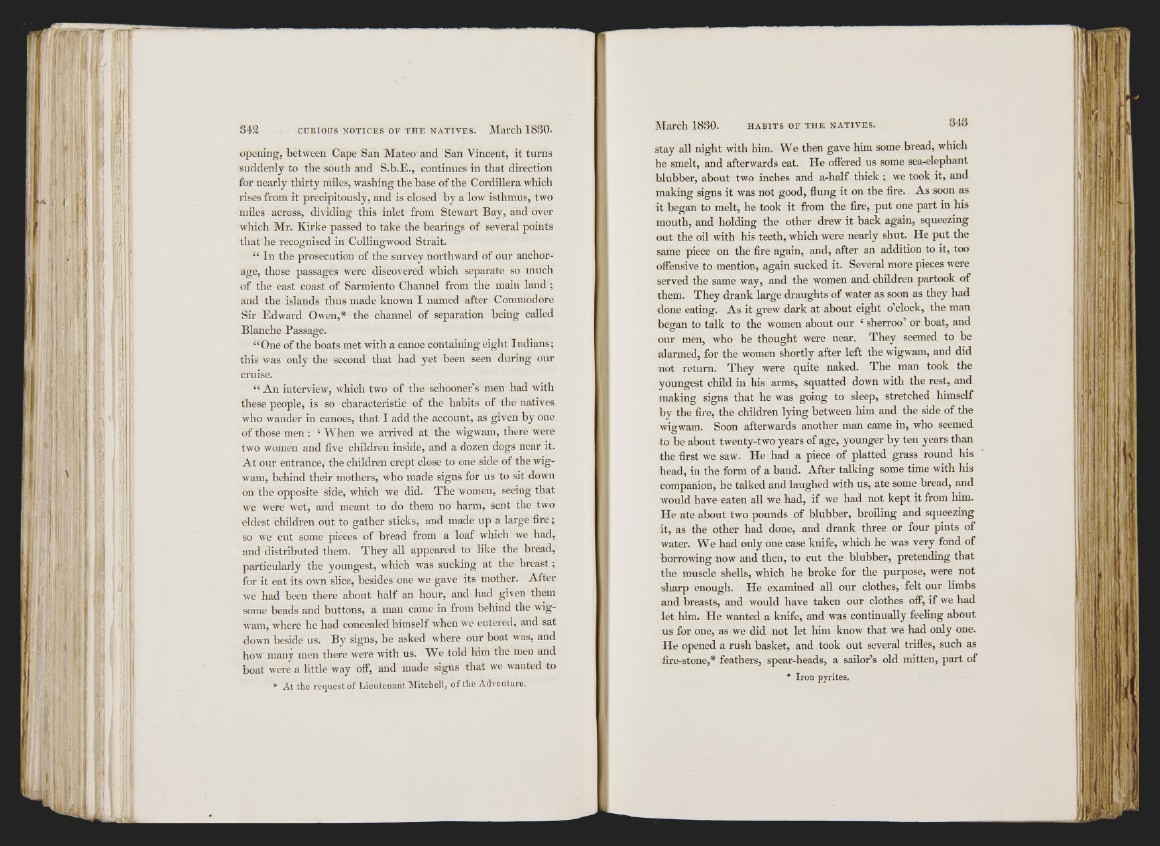
i l
iH v,i
tiK
i !
, 4i
■: f-
■
•i !
il
4 -i!
i: , ::
Ir
i ’
Ila;
1
Ì
■’ ' ‘ i l : '
, , is ili
» ^ T)
h4 -
■ I i i :u'
ojicning, between Cape San Mateo and San Vincent, it turns
suddenly to the south and S.b.E., continues in that direction
for nearly thirty miles, washing the base of the Cordillera which
rises from it precipitously, and is closed by a low isthmus, two
miles across, dividing this inlet from Stewart Bay, and over
which Mr. Kirke passed to take the hearings of several points
that he recognised in Collingwood Strait.
“ In the prosecution of the survey northward of our anchorage,
those passages were discovered which separate so much
of the east coast of Sarmiento Channel from the main land ;
and the islands thus made known I named after Commodore
Sir Edward Owen,* the channel of separation being called
Blanche Passage.
“ One of the boats met with a canoe containing eight Indians;
this was only the second that had yet heen seen during our
cruise.
“ An interview, which two of the schooner’s men had with
these people, is so characteristic of the habits of the natives
who wander in canoes, that I add the account, as given by one
of those men ; ‘ M4ien we arrived at the wigwam, there were
two women and five children inside, and a dozen dogs near it.
At our entrance, the children crept close to one side of the wigwam,
behind their mothers, who made signs for us to sit down
on the opposite side, which we did. The women, seeing that
we were wet, and meant to do them no harm, sent the two
eldest children out to gather sticks, and made up a large fire;
so we cut some pieces of bread from a loaf which we had,
and distributed them. They all appeared to like the bread,
particularly the youngest, which was sucking at the breast;
for it eat its own slice, besides one we gave its mother. After
we had been there about half an hour, and had given them
some beads and buttons, a man came in from behind the wigwam,
where he had concealed himself when we entered, and sat
down beside us. By signs, he asked where our boat was, and
how many men there were with us. We told him the men and
boat were a little way off, and made signs that we wanted to
* At the request of Lieutenant Mitchel], o f the Adventure.
stay all night with him. We then gave him some bread, which
he smelt, and afterwards eat. He offered us some sea-elephanl
blubber, about two inches and a-half thick ; we took it, and
making signs it was not good, flung it on the fire. As soon as
it began to melt, he took it from the fire, put one part in his
mouth, and holding the other drew it back again, squeezing
out the oil with his teeth, which were nearly shut. He put the
same piece on the fire again, and, after an addition to it, too
offensive to mention, again sucked it. Several more pieces were
served the same way, and the women and children partook of
them. They drank large draughts of water as soon as they had
done eating. As it grew dark at about eight o’clock, the man
began to talk to the women about our ‘ sherroo’ or boat, and
our men, who he thought were near. They seemed to be
alarmed, for the women shortly after left the wigwam, and did
not return. They were quite naked. The man took the
youngest child iu his arms, squatted down with the rest, and
making signs that he was going to sleep, stretched himself
by the fire, the children lying between him and the side of the
wigwam. Soon afterwards another man came in, who seemed
to be about twenty-two years of age, younger by ten years than
the first we saw. He had a piece of platted grass round his
head, in the form of a band. After talking some time with his
companion, he talked and laughed with us, ate some bread, and
would have eaten all we had, if we had not kept it from him.
He ate about two pounds of blubber, broiling and squeezing
it, as the other had done, and drank three or four pints of
water. We had only one case knife, which he was very fond of
borrowing now and then, to cut the blubber, pretending that
the muscle shells, which he broke for the purpose, were not
sharp enough. He examined all our clothes, felt our limbs
and breasts, and would have taken our clothes off, if we had
let him. He wanted a knife, and was continually feeling about
us for one, as we did not let him know that we had only one.
He opened a rush basket, and took out several trifles, such as
fire-stone,* feathers, spear-heads, a sailor’s old mitten, part of
• Iron pyrites.
tffll
1ft